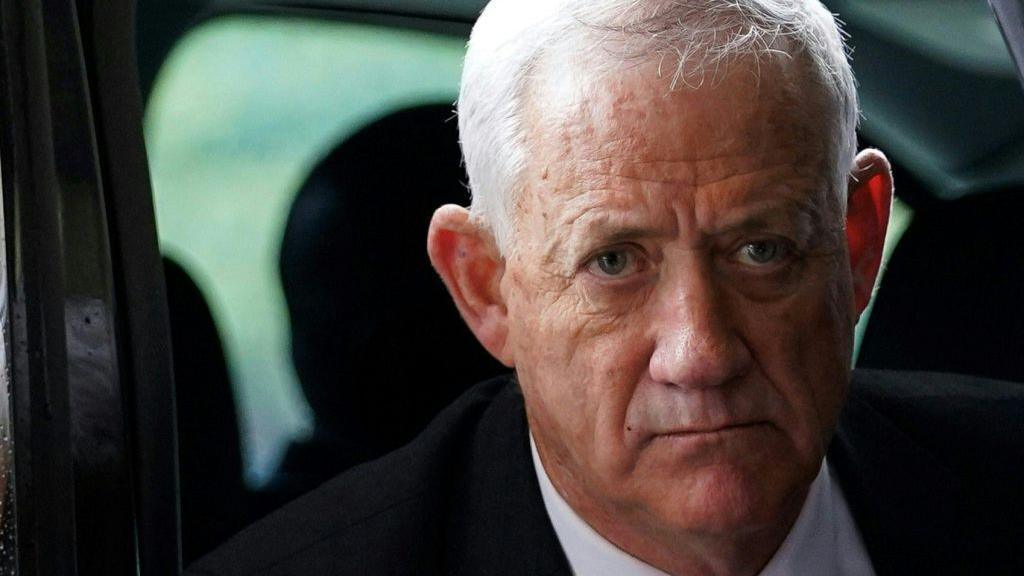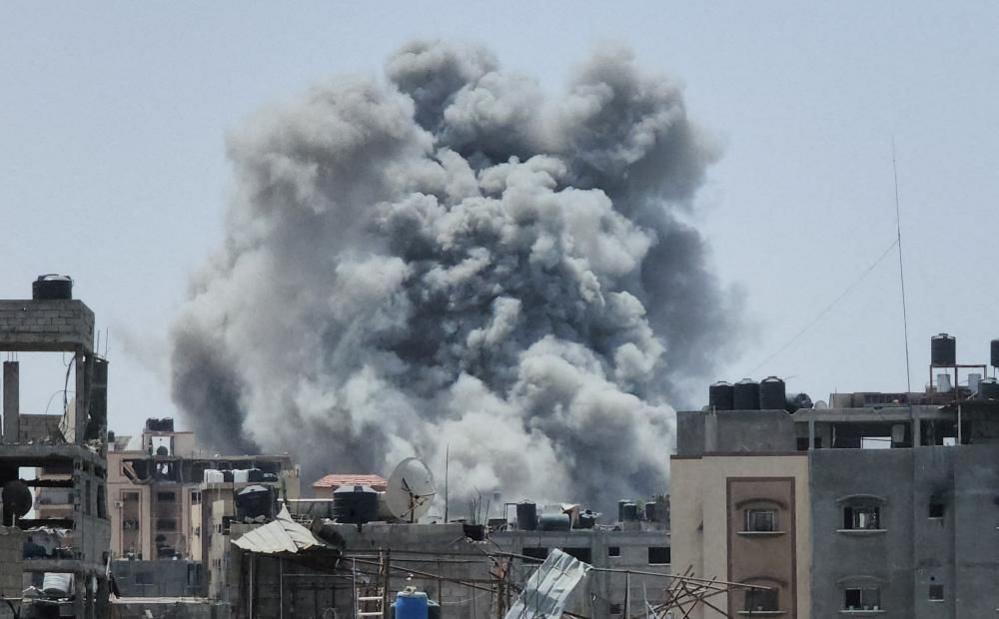Israel war cabinet minister vows to quit if there is no post-war plan for Gaza

- Published
Israeli war cabinet minister Benny Gantz has threatened to resign unless Prime Minister Benjamin Netanyahu sets out a post-war plan for the Gaza Strip.
Mr Gantz set an 8 June deadline for a plan to achieve six "strategic goals", including the end of Hamas rule in Gaza and the establishment of a multinational civilian administration for the territory.
"If you put the national over personal, you will find in us partners in the struggle," he said. "But if you choose the path of fanatics and lead the entire nation to the abyss, we will be forced to quit the government."
Mr Netanyahu dismissed the comments as "washed-up words" that would mean "defeat for Israel".

Israel is pushing tanks and troops further into Jabalia, where it says Hamas has been regrouping
The growing rift comes as fighting rages at both ends of the Gaza Strip, with Israeli forces operating in the southern city of Rafah and the northern town of Jabalia, one of Gaza’s historic refugee camps and an area the Israeli military previously said it had cleared of Hamas fighters.
Mr Gantz was speaking just days after another war cabinet member, Defence Minister Yoav Gallant, urged Mr Netanyahu to state publicly that Israel had no plans to take over civilian and military rule in Gaza.
Mr Gallant said he had raised the issue repeatedly for months but had received no response.
He and Mr Gantz say that maintaining military control in Gaza would increase Israel's security risks, while others, including far-right members of Mr Netanyahu's ruling coalition in the government, believe continued control is necessary in order to defeat Hamas.
In a televised address on Saturday, Mr Gantz told Mr Netanyahu that the "people of Israel are watching you".
"You must choose between Zionism and cynicism, between unity and factions, between responsibility and lawlessness, between victory and disaster," he said.
Also among the six strategic goals he set out were the return of all Israeli and foreign hostages still held by Hamas in Gaza and the return of displaced Palestinian civilians to northern Gaza by 1 September.
He also said Israel should continue to seek the normalisation of relations with Saudi Arabia as part of a "comprehensive process to create an alliance with the free world and the West against Iran and its allies".
Responding to the speech, Mr Netanyahu said that to meet Mr Gantz's demands would lead to "the end of the war and a defeat for Israel, the abandoning of most of the hostages, leaving Hamas intact and the establishment of a Palestinian state".
Israel's war cabinet was established after Hamas attacked Israeli communities near Gaza on 7 October, killing around 1,200 people and taking hostages.
Israel's military campaign against Hamas in Gaza has killed 35,386 people, the Hamas-run health ministry says.
The chief of staff of the country’s army, Herzi Halevi, has also privately pressed on Mr Netanyahu the need for a “day after” strategy, according to reports in Israeli media.
The return of the Israeli military to parts of northern Gaza, like Jabalia, that were previously declared clear of Hamas has raised doubts about the government’s strategy for eliminating the group.
Mr Halevi is said to have argued that, in the absence of a diplomatic process to establish a governing body other than Hamas, the military will be forced to launch repeated campaigns to keep the group at bay.
Mr Gantz proposed an American, European, Arab, and Palestinian administration that could manage civilian affairs in Gaza while the foundations are laid for a future alternative government.
He added that Israel could maintain a degree of "security control" in the meantime.
In Jabalia the Israeli Defense Forces (IDF) said they fought battles with Palestinian armed groups. Palestinian medics said one of the Israeli strikes had killed 15 people.
Hamas said Israel's "brutal raids" on Jabalia had killed dozens of civilians and wounded hundreds more.
Late on Saturday Israel also issued new evacuation orders for parts of northern Gaza, saying armed groups had fired rockets towards its territory.
Last week, Israel began operations in the southern city of Rafah - to which civilians from elsewhere in Gaza had previously been told to evacuate - saying it needed to enter the city in order to target Hamas's last remaining strongholds.
On Saturday, it launched air strikes and raids on targets in the east of the city.
Why has the UN revised its Gaza death toll for women and children?
- Published16 May 2024
Six months on, how close is Israel to eliminating Hamas?
- Published6 April 2024
US confirms first aid trucks arrive via Gaza pier
- Published17 May 2024
Philippe Lazzarini, the head of United Nations Relief and Works Agency (UNRWA), said some 800,000 Palestinians had now left Rafah, seeking shelter in the shattered city of Khan Younis or along the coast.
"Since the war in Gaza began, Palestinians have been forced to flee multiple times in search of safety that they have never found," he said.
"When people move they are exposed, without safe passage or protection. Every time, they are forced to leave behind the few belongings they have: Mattresses, tents, cooking utensils and basic supplies that they cannot carry or pay to transport.
"The claim that people in Gaza can move to 'safe' or 'humanitarian' zones is false. Each time, it puts the lives of civilians at serious risk."
Meanwhile, US President Joe Biden's national security adviser Jake Sullivan is due in Israel on Sunday for talks with Mr Netanyahu and is expected to repeat the Biden administration's opposition to any full-scale Israeli assault on Rafah in the absence of plan to protect civilians.
Mr Sullivan has been holding talks with Saudi Crown Prince Mohammed bin Salman. Saudi state media said they discussed ways to boost aid supplies to Gaza and how to achieve Palestinian statehood.